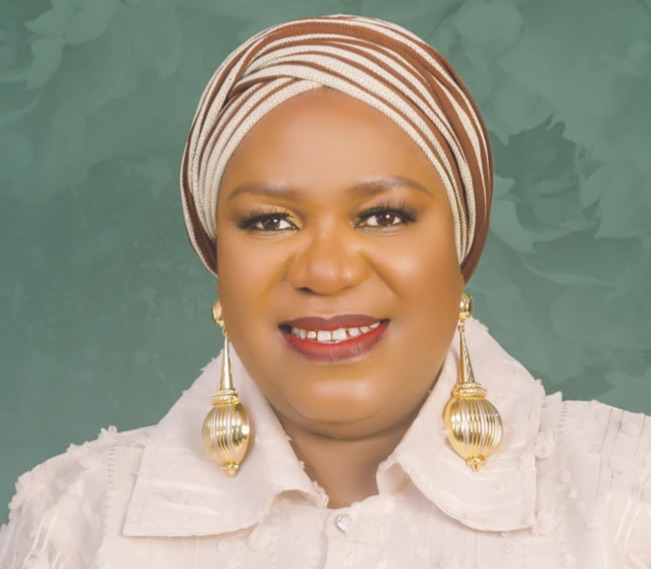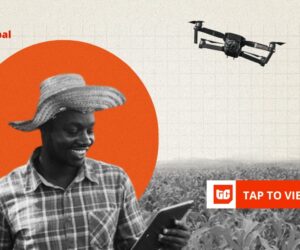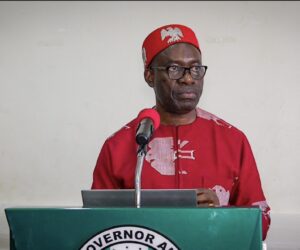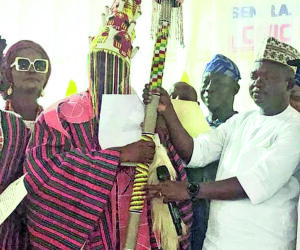By Christy Anyanwu in London
Soledotun Titilope Abdulkarim-Yusuf is a Nigerian town planner and philanthropist, who has made significant contributions to national development. She has been recognized for her commitment to building a better Nigeria.
Her philanthropic activities are done through the Soledotun Abdulkarim-Yusuf Foundation, which has been making impactful contributions to the community. Soledotun has been involved with the Ikoyi Lions Club, demonstrating her dedication to serving humanity. In this interview, she talks about her passion for the boy child and lots more.
What inspired you to establish the Foundation, and what specific needs or challenges did you identify in the community that led you to focus on supporting boys?
The inspiration behind the Soledotun Abdulkarim-Yusuf Foundation for empowerment of the boy child stemmed from a deep awareness of the growing societal neglect of boys in discussions around child development and empowerment. While significant attention has been given to the empowerment of the girl child (which is essential), I noticed a widening gap where boys were being left behind, often without adequate guidance, mentorship, and support systems to navigate life’s challenges. And more so, I am a mother of lovely sons!
The key challenges identified as a mother include the following: lack of structured support for boys. Many boys grow up without strong mentorship, leading to issues such as low self-esteem, identity crises, and behavioral problems; negative peer influence and crime, which leads boys that do not have proper guidance to turn to unhealthy coping mechanisms, engaging in delinquency or crime due to peer pressure; educational struggles and dropout rates, whereby you find boys in certain communities struggle academically, sometimes dropping out of school due to financial constraints or lack of motivation.; mental health and emotional well-being – the society often expects boys to suppress emotions, leading to long-term mental health challenges; father absence and role models – many boys grow up in single-parent households, lacking positive male figures to guide them toward responsible adulthood.
The foundation was created to bridge this gap by providing boys with the necessary mentorship, education, skill development, and emotional support to help them grow into responsible and successful individuals. Our goal is to empower boys to thrive in all aspects of life—academically, socially, and emotionally—ensuring they become positive contributors to their communities and society at large.
So, what impact has the work of the foundation made in the lives of the boys?
The foundation is making tangible positive impact on the lives of boys by addressing key areas of their development, such as mentorship, education, life skills, and mental well-being. Through our initiatives, we have observed significant improvements in their confidence, behavior, and overall outlook on life.
We have seen improved self-esteem and confidence. Many boys who once struggled with identity issues or societal pressures now have a stronger sense of self-worth. Through mentorship programmes, they are learning to express themselves better and believe in their potential. There has been academic and skill development growth – we’ve seen an increase in boys staying in school, improving their grades, and even pursuing vocational skills that give them a sense of purpose and direction. We have visited and created awareness in three higher institutions like University of Lagos, Lagos State University and University of Port Harcourt and other tertiary institutions. We are seeing evidence of better decision-making and reduced negative peer influence through their engagement with positive role models and mentors. Boys are making better life choices, avoiding delinquency, and steering clear of bad influences.
Moreover, we are seeing stronger emotional and mental health awareness. We emphasize mental well-being by teaching boys that it’s okay to express their emotions and seek help when needed. This has helped many of them build resilience and emotional intelligence. We have been able to help a 10-year-old boy dealing with mental health to pay for his medical bills at Neuro-psychiatric Hospital Aro-Abeokuta.
What are the biggest challenges you face in running the foundation, and how do you overcome them?
As a nonprofit organisation, securing consistent funding to sustain and expand programmes can be difficult. Many donors and organizations are more inclined to support initiatives focused on the girl child, making fundraising for boys’ empowerment more challenging. I actively seek support from friends, family and associates.
Also, there is a misconception that boys do not need as much support as girls, leading to a lack of urgency in addressing their challenges. Therefore, I focus on advocacy and awareness campaigns to educate the public on why the boy child needs empowerment by having a program on social media every month, whereby I bring experts to discuss topics relating to the boy child and I also hold physical workshops basically on drug abuse, skill acquisition and so on. Sharing success stories and data-driven impact reports helps change the narrative.
Although, boys, especially teenagers, can sometimes be reluctant to open up or participate in mentorship programmes I create interactive, engaging programmes that incorporate sports, technology, and hands-on activities to keep them interested. Having relatable mentors and role models also encourages participation.
What are some of the biggest challenges you face in running the Boy Child Foundation, and how do you overcome them?
As a nonprofit, securing consistent funding to sustain and expand programs can be difficult. Many donors and organizations are more inclined to support initiatives focused on the girl child, making fundraising for boys’ empowerment more challenging. I actively seek support from friends, family and associates
How do you balance your time and energy between your professional life and your volunteer work, and what strategies do you use to prioritize your commitments?
Balancing my professional life, volunteer work, and personal commitments requires intentional discipline and a strong support system. Since I am deeply involved in multiple roles—including my work as a Town Planner, my leadership roles in Lions International, managing La Dots Party City, and running the Soledotun Abdulkarim-Yusuf Foundation—I have developed effective strategies to ensure I stay productive and fulfilled in all areas of my life.
Key strategies I use to prioritize and balance my commitments include deploying strict time management and structured scheduling practices. I use a detailed planner (digital and physical) to allocate time for work, meetings, foundation activities, and personal time. I prioritize my tasks using the Eisenhower Matrix, which has the following categories: urgent and important (tasks that require immediate attention, such as project deadlines and critical foundation cases); important but not urgent (strategic planning, networking, and mentorship); urgent but not important (tasks I can delegate); neither urgent nor mportant (I eliminate or minimize these distractions.)
What advice would you give to other individuals or organizations looking to start a foundation or initiative focused on supporting boys, and what lessons have you learned along the way?
Starting a foundation or initiative focused on supporting boys requires passion, commitment, and a strategic approach. Over the years, I have learned valuable lessons that can help others looking to embark on a similar journey.
Here’s my advice: identify the core issues and needs – before starting, conduct research to understand the specific challenges boys face in your community; engage parents, teachers, and community leaders to gain insights into the root causes of these issues; start small and stay consistent; you don’t need a massive budget to start—begin with small, impactful programmes like mentorship sessions, skills training, or awareness campaigns; The key is consistency—even a small initiative can grow into a movement if sustained over time; build a strong support network; surround yourself with like-minded people who share your vision—mentors, volunteers, and professionals who can contribute their expertise; collaborate with schools, religious organizations, and other nonprofits to expand your reach.
Engage boys in a relatable way – boys are more likely to open up and participate if they see relatable role models and success stories; advocate and change the narrative. One challenge in boy child empowerment is the lack of societal urgency—many people assume boys don’t need help. Use social media, storytelling, and awareness campaigns to shift the narrative and emphasize the importance of supporting boys. Diversify your funding sources – relying on one funding source can be risky. Explore grants, corporate sponsorships, crowdfunding and community donations. Show impact through data and success stories to encourage ongoing support from donors; measure impact and continuously improve. Track progress using both qualitative and quantitative metrics (e.g., behavior changes, academic progress and skills development). Be open to feedback and adapt your programs to better meet the needs of the boys.
What motivates you to continue volunteering for humanitarian service causes, and how do you find fulfillment in this work?
My motivation to continue volunteering for humanitarian service causes comes from a deep sense of purpose, compassion, and the desire to create meaningful change in the lives of others. Coming from a background whereby my parents are kind hearted people. I grew up seeing my late dad impact positively in the lives of the less fortunate ones and also my mother. Her kindness is top notch. I started volunteering and impacting in the lives of others right from my primary school days in Ijebu Ode. Seeing the impact of my efforts—whether through the empowerment of boys, community development, or service projects—fuels my commitment to making a difference. And being a member of the largest non-profit organization in the World the Lions International where we serve the community in eight different focus areas motivates me to do more for humanity
What drives your passion for humanitarian service?
The major thing is the joy of transforming lives. Witnessing positive changes in the lives of the people I serve—whether it’s a boy gaining confidence, a struggling student excelling, or a community benefiting from a project—gives me a deep sense of fulfillment. Two ,knowing that my work creates opportunities for others keeps me motivated. Three, having a strong sense of purpose and responsibility – I believe that everyone has a role to play in building a better society, and I see my work as my contribution to this greater mission. The more I serve, the more I realize that even small acts of kindness can have a lasting impact. Again, I am happy with the ripple effect of giving back. When you invest in others, they, in turn, go on to uplift their families, communities, and even future generations. This ripple effect inspires me to keep going, knowing that the impact of humanitarian work extends far beyond what I can see immediately. I have experienced personal growth and learning because humanitarian service has taught me resilience, leadership, empathy, and problem-solving skills. Every challenge presents an opportunity to learn and grow, making me a better leader and a more compassionate individual. The camaraderie and community of Service, and being surrounded by like-minded individuals in humanitarian work—whether in Lions International, my foundation, or community service groups—is incredibly rewarding. Working alongside people who share the same passion for service creates strong bonds and a supportive network.
Can you share a personal story or experience that has touched your heart or had a profound impact on you during your volunteer work?
This visit was truly a deeply emotional and fulfilling moment for me. Seeing Ayomide walk into our office, smiling and full of gratitude, reminded me why I do this work. When Pastor Olusola Osinowo first reached out, it was clear that Ayo needed more than just prayers—he needed urgent medical intervention. The fact that his father, Pastor Oluwarotimi Samson, had already taken him to Federal Neuro-Psychiatric Hospital, Aro, Abeokuta, but couldn’t afford the cost of diagnosis and treatment, made the situation even more critical.
Through the Soledotun Abdulkarim-Yusuf Foundation (SAF), for the empowerment of the boy child, we were able to step in, cover the medical diagnosis and part of the treatment, and restore hope to this young boy and his family. Seeing his health improve significantly was a powerful reminder that when we come together to support those in need, miracles happen.
His visit to Lagos from Ifo Ogun State alongside his father and Pastor Sola Osinowo was not just a moment of appreciation but a symbol of transformation and possibility. Ayo was so full of joy—his happiness was contagious! This experience reaffirmed my belief that: every child, regardless of background, deserves a chance at a better life; mental health support for boys is just as important as any other aspect of their well-being; sometimes, all it takes is one act of kindness to change a life forever. This visit was not just a thank you—it was a testament to the fact that we must continue this mission of empowering and uplifting boys who need our help. And it remained indelible moments in my volunteering work.
How do you stay energized and inspired to continue making a difference, especially when faced with challenges or setbacks in your volunteer work?
Staying energized and inspired in volunteer work, especially when facing challenges, requires a combination of passion, self-care, a strong support system, and a deep connection to purpose. Over the years, I have encountered setbacks—whether it’s limited resources, societal resistance to boy-child empowerment, or moments of exhaustion—especially in my humanitarian service as a member of Lions international but I have developed strategies to keep going. First, I stay connected to my ‘Why’ – by constantly reminding myself why I started—to empower boys, advocate for their well-being, and create opportunities for them to thrive. Every time I feel discouraged, I reflect on the lives that have been transformed through my efforts. A single success story can reignite my motivation. I celebrate small wins – impact doesn’t always come in big moments—sometimes, it’s in the small, consistent efforts that add up. Whether it’s a boy gaining confidence, excelling in school, or avoiding negative influences, I take time to appreciate these victories.
I surrounding myself with like-minded people: being part of service-driven communities like Lions International, my foundation team, and professional networks helps me stay motivated. Sharing ideas, experiences, and encouragement with other change-makers reminds me that I’m not alone in this journey.
I practicing self-care and avoiding burnout. Rest is a part of service—I ensure I take breaks, recharge, and engage in activities that bring me joy. I set boundaries to avoid over-committing myself, so I can serve sustainably without feeling drained. I make great effort to learn and growing continuously. Attending conferences, workshops, and leadership training keeps me informed and inspired. I read books, listen to podcasts, and engage with global movements focused on humanitarian work.
Most importantly, I seek divine strength. My faith plays a key role—I pray, meditate, and trust in a greater purpose to keep me going. I practice gratitude, focusing on the positive impact already made rather than dwelling on obstacles. I embrace challenges as part of the journey – in this way I view setbacks as opportunities for growth rather than reasons to quit. Challenges often push me to innovate, strategize, and find better solutions for the boys I support. Challenges will always come, but the joy of seeing lives change makes every effort worthwhile. As long as there are boys who need guidance, families who need support, and a society that needs balance, I will continue to push forward, energized, inspired, and committed.








